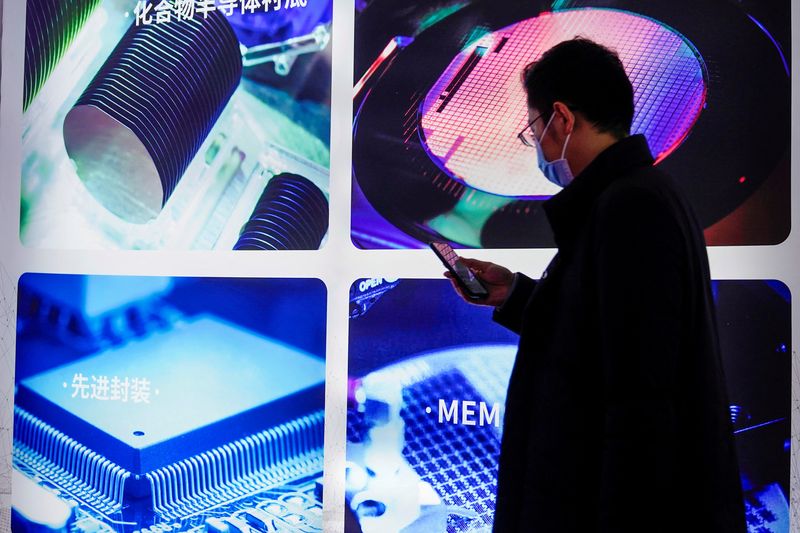By Josh Horwitz
SHANGHAI (Reuters) - The sweeping restrictions imposed on Russia to block its access to global exports of goods from chips to computers and electronics are likely to accelerate China's own push for self-reliance in the semiconductor industry, analysts said.
Following Russia's invasion of Ukraine on Thursday, Washington - as part of a package of measures - announced export restrictions which will force companies making high- and low-tech items overseas with U.S. tools to seek a licence from the United States before shipping to Russia.
China, like Russia, lacks advanced chip manufacturing capacity but one of its top long-term policy goals is to establish independence and self-reliance in the semiconductor industry.
The importance of such self-sufficiency became apparent when Huawei Technologies Co Ltd's smartphone business collapsed following sanctions on the company imposed by the U.S. in 2019 that cut off much of its overseas chip supply and effectively barred it from building its own.
One chip consultant in China, who requested anonymity due to the sensitivity of the topic, said China will likely "watch and learn" from the sanctions and their impact on Russia.
"The Russians have a failed chip industry and rely on global semiconductors. So if there are technology issues that come out during the 'non-invasion' from sanctions, it reinforces Beijing's desire to own the technology for itself."
Washington further hobbled China's plans for tech supremacy by expanding sanctions to include the country's top chipmaker Semiconductor Manufacturing International Corp (SMIC) in 2020.
SMIC was forced to abandon plans to manufacture some types of advanced chips when the U.S. revoked an export license for Dutch lithography machine maker ASML Holding (NASDAQ:ASML) NV.
Over the past ten years, China, the world's largest importer of chips, has poured funding into semiconductor projects as part of the "Made in China 2025" initiative, which calls for 70% self-sufficiency in core components for critical technologies by the middle of the decade.
Its chip industry is growing fast, thanks to venture capital funding and political incentives. But the country's global share of chip exports remains marginal - its fabless chipmakers occupy about 16% of global market share, according to the Semiconductor Industry Association.
That also limits how much China can do to aid a heavily-sanctioned Russia.
"China alone can't supply all of Russia's critical needs for the military," a senior U.S. administration official said.
"China doesn't have any production of the most advanced technology nodes. So Russia and China are both reliant on other supplier countries and of course U.S. technology to meet their needs."
China shipped approximately $10 billion worth of electronics to Russia in 2020, according to U.N. Comtrade data, accounting for roughly 20% of its total exports.
Smartphone shipments account for a large chunk of that as Chinese brands such as Xiaomi (OTC:XIACF) Corp and Realme are among top-sellers in Russia.

"Russia's chip consumption is not big and more than half is probably from China already," said Doug Fuller, who researches China's technology policy at the City University of Hong Kong.
"China may pick up an extra $200 million in exports approximately if chips from elsewhere are completely cut off, and some of the chips Russia needs China can't make anyway."